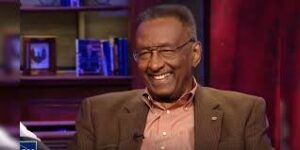The world has lost a voice for logic, liberty, and love of the U.S. Constitution. Economist Walter Williams died December 2 at the age of 84.
Williams worked his way out of grinding poverty in the Philadelphia housing projects to chair George Mason University’s economics department, author 10 books, and more than 150 publications, and become one of the most recognized commentators of the last four decades. Williams spread his message of racial equality, the dignity of work, and the morality of capitalism through his syndicated newspaper column, PBS documentaries, and frequent radio and TV appearances. He is survived by his daughter, Devyn.
Walter Edward Williams was born on March 31, 1936, in Philadelphia. His father abandoned the family, leaving his wife, Catherine, to raise their three-year-old son and two-year-old daughter. Catherine took intermittent work as a domestic servant while living in the Richard Allen housing projects of Philadelphia, where Williams grew up at the same time as Bill Cosby. His mother encouraged her children’s intellectual development by taking them to museums, art galleries, and libraries.
 Williams, who described himself as a “troublemaker,” began working honest jobs as a shoe-shine boy, in mail departments, and in commercial deliveries from a young age – too young for the law. The Labor Department ejected a 15-year-old Williams from a sewing job for working while underage. Despite its dubious legality, Williams credited his young work history for instilling the drive and habits that would take him to the heights of his profession.
Williams, who described himself as a “troublemaker,” began working honest jobs as a shoe-shine boy, in mail departments, and in commercial deliveries from a young age – too young for the law. The Labor Department ejected a 15-year-old Williams from a sewing job for working while underage. Despite its dubious legality, Williams credited his young work history for instilling the drive and habits that would take him to the heights of his profession.
He would be drafted into the Army in the 1950s. (“My labor services were confiscated by the U.S. government,” Williams quipped.) He was stationed in Georgia, where he first encountered racial segregation and where he first began to speak out publicly, eventually writing letters to President John F. Kennedy. He rebelled against the typical practice of assigning blacks second-class jobs: When ordered to paint a truck, he painted the entire truck – including the headlights. After an unrelated incident, he would successfully defend himself from court-martial while acting as his own counsel.
Read the full Acton article


